There are those who claim "myself" is correct because the sentence is in the passive (???), whereas if we switch it around [...] it all of a sudden magically "becomes" the active voice, so you can no longer use myself, you have to use I.
This is just wrong. The presence of reflexive pronouns is not a test for passivity. My example below, "I introduced myself" is a counterexample.
Below, I'll detail when to use "myself" and show why it's unrelated to voice.
So, to me, a speaker of American English,
The marathon participants were Harry, Luke and myself.
and
The marathon participants were Harry, Luke and me.
are both okay, neither sounds totally grammatical.
The use of reflexive pronouns in English can be explained in X' theory using c-command. An argument c-commands another if it is higher in the deep structure of the sentence, and the reflexive is embedded within its complement.
Further, a reflexive takes its meaning from the argument that c-commands it. So in order to need to say "myself," that must be "I" higher in the tree.
Take this tree below. The determiner phrase "I" c-commands "myself" because "myself" is embedded within I'. This is starting to get technical, so basically, everything within I' is c-commanded by the DP "I" because I' is next to DP in the tree.
Here, "IP" stands for "inflection phrase" and isn't important to understanding the relationship.

The same page has a second tree for the sentence *"Myself is so proud of me." There is no "I" higher in the tree than myself so this sentence is bad (we usually say "ungrammatical.") Don't worry about intermediate structure of the sentence.

I suspect that your first sentence, "The marathon participants were Harry, Luke, and myself" is acceptable to you because the person that "myself" refers to is a member of "marathon participants." Other people may not be able to interpret these phrases in the same way, and might find it marginal or "and me" better.
Likewise, *"Harry, Luke and myself were the marathon participants" is bad because there is nothing structurally above "myself."
Finally, you can say "The marathon was participated in by Harry, Luke and me" but not "The marathon was participated in by Harry, Luke and *myself." because there is nothing to c-command "myself" that is interpretable to refer to the same person.
Let me know if I can make this explanation more clear in any way.
Notes:
Trees are from the Wikibooks Government and Binding Theory book.
In linguistics, we denote ungrammatical sentences/elements with an asterisk, as I've done above.
X' is pronounced "X-bar."


